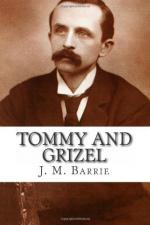Thus, owing to Elspeth’s behaviour, it can never be known which was the passage quoted in the House; but we may be sure of one thing—that it did the House good. That book did everybody good. Even Pym could only throw off its beneficent effects by a tremendous effort, and young men about to be married used to ask at the bookshops, not for the “Letters,” but simply for “Sandys on Woman,” acknowledging Tommy as the authority on the subject, like Mill on Jurisprudence, or Thomson and Tait on the Differential Calculus. Controversies raged about it. Some thought he asked too much of man, some thought he saw too much in women; there was a fear that young people, knowing at last how far short they fell of what they ought to be, might shrink from the matrimony that must expose them to each other, now that they had Sandys to guide them, and the persons who had simply married and risked it (and it was astounding what a number of them there proved to be) wrote to the papers suggesting that he might yield a little in the next edition. But Sandys remained firm.
At first they took for granted that he was a very aged gentleman; he had, indeed, hinted at this in the text; and when the truth came out ("And just fancy, he is not even married!”) the enthusiasm was doubled. “Not engaged!” they cried. “Don’t tell that to me. No unmarried man could have written such a eulogy of marriage without being on the brink of it.” Perhaps she was dead? It ran through the town that she was dead. Some knew which cemetery.
The very first lady Mr. Sandys ever took in to dinner mentioned this rumour to him, not with vulgar curiosity, but delicately, with a hint of sympathy in waiting, and it must be remembered, in fairness to Tommy, that all artists love sympathy. This sympathy uncorked him, and our Tommy could flow comparatively freely at last. Observe the delicious change.
“Has that story got abroad?” he said simply. “The matter is one which, I need not say, I have never mentioned to a soul.”
“Of course not,” the lady said, and waited eagerly.
If Tommy had been an expert he might have turned the conversation to brighter topics, but he was not; there had already been long pauses, and in dinner talk it is perhaps allowable to fling on any faggot rather than let the fire go out. “It is odd that I should be talking of it now,” he said musingly.
“I suppose,” she said gently, to bring him out of the reverie into which he had sunk, “I suppose it happened some time ago?”
“Long, long ago,” he answered. (Having written as an aged person, he often found difficulty in remembering suddenly that he was two and twenty.)
“But you are still a very young man.”
“It seems long ago to me,” he said with a sigh.
“Was she beautiful?”
“She was beautiful to my eyes.”
“And as good, I am sure, as she was beautiful.”
“Ah me!” said Tommy.




